In every community, children live through circumstances far beyond their control. They come from a tapestry of backgrounds, each with its unique story, often marked by challenges and hardships.
The critical need for loving, supportive foster parents has never been more apparent. These dedicated individuals offer a beacon of hope, providing the care, stability, and compassion that can truly transform a child’s life.
What is Foster Care?
Foster care is a temporary arrangement that offers children a safe and stable environment when they cannot remain with their biological families.
Various types of foster care exist to meet different needs, including emergency, respite, short-term, and long-term placements. Each type serves a unique purpose, ensuring children find the proper support at the right time.
Benefits of Fostering
Becoming a foster parent isn’t just about providing a home; it’s about making a tangible difference in a child’s life.
The benefits of fostering extend both ways, enriching the lives of foster families with unique experiences and the profound satisfaction of knowing they’ve played a critical role in a child’s journey to healing and growth.
Are You Ready to Foster?
Fostering a child is a significant decision that comes with its own set of challenges and rewards. Prospective foster parents should consider their motivation, emotional readiness, commitment level, and support system.
It’s important to reflect on your ability to handle sensitive situations, including open adoptions, the child’s potential history of abuse or neglect, and the prospect of reunification with their biological family.
Also read: Do You Get Paid for Fostering Children?

The Process of Becoming a Foster Parent
Choosing the right agency is a crucial first step in the fostering process. Exploring options, including public and private agencies, faith-based organizations, and those specializing in specific needs, can help you find the best fit for your family.
The journey begins with an initial inquiry and a comprehensive home study process. This includes interviews, background checks, home inspections, and reference gathering. It is vital to be collaborative, transparent, and open to feedback during this stage.
Prospective foster parents undergo pre-service training covering essential topics such as child development, trauma, and first aid. Understanding the state-specific requirements and timeline for licensing or approval is also crucial.
Preparing Your Family and Home
Preparing your family and home is an essential step. This involves having age-appropriate discussions with your biological children, ensuring your home meets safety requirements, and creating a welcoming environment for the foster child.
Equally important is your mental and emotional readiness. Prospective foster parents must engage in support groups, practice self-care, and continually seek educational resources.
The First Placement
Understanding the child’s background and needs can help ease the transition. Patience, empathy, and a sense of safety are crucial during this period, as is focusing on building trust and establishing routines.
Ongoing Support and Challenges
It is vital to have a strong, cooperative relationship with the caseworker and understand the challenges, such as behavioral issues and emotional ups and downs. Access to support groups, therapy, and educational materials can be incredibly beneficial.
Conclusion
Consider becoming a foster parent to make a difference in a child’s life. The journey may be challenging, but your impact is immeasurable.
Numerous resources, including national organizations, state-specific websites, and local support groups, are available for those interested in exploring this path further. Embrace the opportunity to transform a life and, perhaps, your own.
FAQs
What are the benefits of becoming a foster parent?
Becoming a foster parent offers numerous benefits, including the profound satisfaction of making a tangible difference in a child’s life, the opportunity to enrich your family’s life experience, and the chance to support a child through a critical development period.
How do I know if I can become a foster parent?
Consider your motivation, emotional readiness, commitment to the time and training involved, and support system. Reflect on your ability to handle the complexities of fostering, including dealing with the child’s past traumas, maintaining open adoptions, and the possibility of reunification with their biological family.
What is involved in the process of becoming a foster parent?
The process includes finding and choosing the right agency, making an initial inquiry, undergoing a home study (including interviews, background checks, and home inspections), completing pre-service training, and meeting state-specific licensing or approval requirements.
How should I prepare my family and home for fostering?
Prepare by discussing the idea with your family, ensuring everyone is on board and understands the role they will play. Prepare your home to meet safety requirements and create a welcoming environment for the foster child. Also, focus on your mental and emotional readiness, including participating in support groups and practicing self-care.
What happens during the first placement?
The agency will match a child with your family based on the child’s needs and your family’s capacity to meet those needs. Prepare by gathering information about the child’s background, likes, dislikes, and routines. The transition period is crucial, requiring patience, understanding, and a focus on building trust and security.
How can I navigate the ongoing challenges of fostering?
Maintain a strong relationship with the caseworker, utilize available resources such as support groups and therapy services, and be prepared to navigate challenges, including behavioral issues and emotional ups and downs. Remember, fostering is a team effort, and support is available to help you manage the challenges that come your way.








